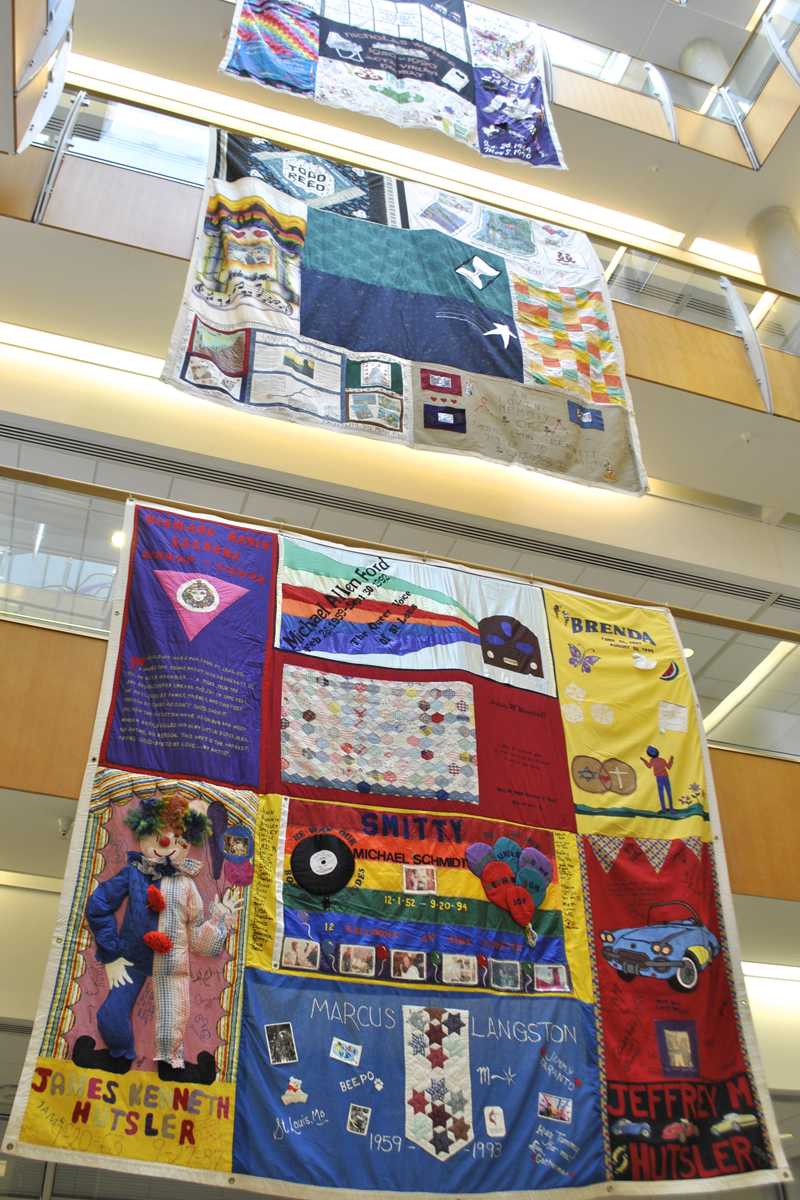
In commemoration of victims of the disease and World AIDS Day, four panels from the AIDS Memorial Quilt will hang in the atrium of the Bond Life Sciences Center until Wednesday.
The AIDS Memorial Quilt is a collection of more than 48,000 panels of prayers, poems and paintings dedicated to more than 94,000 victims of AIDS. The quilt was started in 1987 and now weighs approximately 54 tons.
In 2009, an estimated 1,148,000 people were living with an HIV infection in the U.S. Every year, approximately 50,000 people are infected, according to the Center for Disease Control and Prevention.
Sections of the quilt travel the country to provide comfort for those who have lost a loved one to AIDS and to create discussion about the disease. This echos the goals of World AIDS Day: “to unite people in the fight” against AIDS, to “show support for those living” with the disease and to commemorate the victims.
Kevin Clohessy, chairman of the board for Trail to a Cure, said he hopes the day’s events will improve knowledge and further acceptance of the virus. Trail to a Cure is a group that fundraises and donates to HIV support centers and research.
“Our presence, our actions, our events around World AIDS Day will further discussion,” Clohessy said. “We want to demystify the disease. This is something we need to address.”
World AIDS Day has been observed annually on Dec. 1 for 24 years. Along with the quilt, Columbia will mark World AIDS Day with a remembrance service and a series of speakers. Because the day falls on a weekend, most events take place Wednesday.
Participants will hang flags down Broadway between Seventh and Tenth streets on Monday. At 6 p.m. the public is invited to a remembrance service in the atrium of the Life Sciences Center. Family and friends of victims of the virus, support organizations and AIDS researchers from the center will be in attendance.
After the service, Gwen Barringer and Shawn Decker, a heterosexual couple living with AIDs, will present “A Girl, a Boy, a Virus and the Relationship That Happened Anyway,” a talk about living with HIV. Decker was infected with HIV as a child during a blood transfusion.
Karla Carter, the coordinator for the events at the center, said she hopes the couple’s talk will help people understand that the virus infects every type of person.
“Usually people compartmentalize HIV … to homosexual men,” Carter said.
After the speakers, there will be a reception and MU researchers will present their findings from their HIV research. Stefan Sarafianos, a Life Sciences Center researcher, recently identified a mutant form of HIV that is resistant to the most common HIV-inhibitors. By identifying and decoding the mutant form, the team is one step closer to understanding how the disease mutates and one step closer to creating more effective treatments.
Carter said she hopes the event will showcase the researchers’ work and help the public understand what research is being done to fight AIDS.
“It’s important to us at the Life Sciences Center to not be seen as sitting at the bench just doing science,” Carter said. “We have a public obligation to communicate what we’re doing and its impact.”
Likewise, Carter said she hopes the researchers will also get to see the impact of their work in the families and those who live with the virus.
“It’s important for our researchers to see their impact on the public and let them know they have an impact,” Carter said.
Along with the other events, free HIV testing will be provided as part of World AIDS Day. It will be available in the MU Student Center from 10 a.m. to 3 p.m. on December 5.
Getting tested and remaining open-minded are the best ways college students can fight the virus, according to Carter.
“If you don’t get tested, you give the virus a chance to mutate,” Carter said.